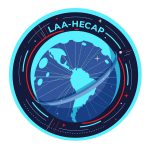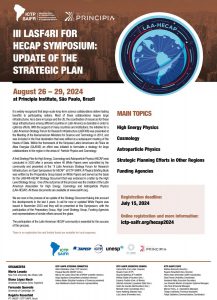III LASF4RI for HECAP Symposium: Update of the Strategic Plan


August 26 – 29, 2024
ICTP-SAIFR, São Paulo, Brazil
Venue: Principia Institute
Zoom ID: 842 5530 7165
Password: strategic
Home
It is widely recognized that large-scale long-term science collaborations deliver lasting benefits to participating nations. Most of these collaborations require large infrastructures. As is done in Europe and the US, the coordination of resources for these large infrastructures among different countries in Latin America is desirable in order to optimize efforts. With the support of many countries and institutions, the initiative for a Latin American Strategy Forum for Research Infrastructure (LASF4RI) was presented at the Meeting of the Iberoamerican Ministers for Science and Technology in 2018, and was included in the final declaration that was ratified at a subsequent meeting of the Heads of State. Within the framework of the Simposio Latino Americano de Física de Altas Energias (SILAFAE) an effort was initiated to formulate a strategy for large collaborations in the region in the areas of Particle Physics and Cosmology.
A first Strategy Plan for High Energy, Cosmology and Astroparticle Physics (HECAP) was concluded in 2020 after a process where 40 White Papers were submitted by the community and presented at the “II Latin American Strategy Forum for Research Infrastructure: an Open Symposium for HECAP” at ICTP-SAIFR. A Physics Briefing Book was written by the Preparatory Group based on White Papers and served as the basis for the LASF4RI-HECAP Strategy Document that was endorsed in a letter by the High Level Strategy Group. One of the outcomes of this process was the creation of the Latin American Association for High Energy, Cosmology and Astroparticle Physics (LAA-HECAP). All these documents are available at www.lasf4ri.org.
We are now in the process of an update of the Strategy Document taking into account the developments in the last 4 years. A call for new or updated White Papers was issued in November 2023 and they will be presented at this Symposium, with the participation of the Preparatory Group, High Level Strategy Group, Funding Agencies and representatives of similar efforts around the globe.
The participation of the Latin American HECAP community is essential for the success of this process.
There is no registration fee and limited funds are available for local expenses.
The submitted White Papers can be found here.
- Marta Losada (New York University Abu Dhabi, UAE)
- Diana López Nacir (University of Buenos Aires, Argentina)
- Fernando Quevedo (University of Cambridge, UK)
- Rogério Rosenfeld (IFT-UNESP)
List of participants: Updated on August 28, 2024.
Survey: Here
Invited Speakers
-
Luciano Maiani – chair of the LASF4RI High Level Strategy Group
-
Ricardo Galvão – Conselho Nacional de Desenvolvimento Científico e Tecnológico (CNPq, Brazil)
-
Sylvio Canuto – Fundação de Amparo à Pesquisa do Estado de São Paulo (FAPESP, Brazil)
-
Rafael Anta – Banco Interamericano de Desenvolvimento (BID)
-
Sharapyia Kakimova – Agencia Nacional de Investigación y Desarrollo (ANID, Chile)
-
Ana Patricia Torres – Consejo Nacional de Humanidades, Ciencias y Tecnología (CONAHCYT, Mexico)
-
Federico Sanchez – Comisión Nacional de Energía Atómica (CNEA, Argentina)
-
Enrique Pazos – Secretaría Nacional de Ciencia y Tecnologia (SENACYT, Guatemala)
-
Martijn Mulders (CERN)
- Yifang Wang (Institute of High Energy Physics – Beijing)
- Christophe Grojean (DESY & CERN)
- Hitoshi Murayama (University of Caligfornia – Berkeley)
- Paris Sphicas – chair of European Committee for Future Accelerators
- Kétévi Assamagan (Brookhaven National Laboratory)
- Marta Losada (New York University Abu Dhabi)
Registration
Program
The program might be changed.
Videos and Files
- 09:30 - Ricardo Galvão (Conselho Nacional de Desenvolvimento Científico e Tecnológico (CNPq, Brazil)): CNPq and Brazilian Participation in HECAP International Collaborations
- 10:00 - Sylvio Canuto (FAPESP, Brazil): III LASF4RI for HECAP Symposium: Update of the Strategic Plan
- 11:00 - Rafael Anta (BID): Supporting the Development of Science, Technology and Innovation in Latin America and the Caribbean
- 11:30 - Sharapyia Kakimova (ANID, Chile): Agencia Nacional de Investigación y Desarrollo- ANID
- 12:30 - Ana Patricia Torres (CONAHCYT, Mexico): Humanities, Science, Technology and Innovation Policies in Mexico
- 14:00 - Federico Sanchez (CNEA, Argentina): Involvement in HECAP projects
- 14:30 - Enrique Pazos (SENACYT, Guatemala): Highlights on science public funding in Guatemala
- 15:00 - Martijn Mulders (CERN): Latin American Participation in the CERN experimental HEP programme
- 15:30 - Lia Merminga (FERMILAB): Fermilab Strategic Plan and Latin American Collaborations
-
09:00 - Yifang Wang (Institute of High Energy Physics – Beijing):
Circular Electron-Positron Collider in China
- 09:30 - Christophe Grojean (DESY & CERN): Future Circular Collider
-
10:00 - Hitoshi Murayama (University of Caligfornia – Berkeley):
Exploring the Quantum Universe
-
11:00 - Paris Sphicas (chair of European Committee for Future Accelerators):
TBA
- 11:30 - Kétévi Assamagan (Brookhaven National Laboratory): African Strategy for Fundamental and Applied Physics (ASFAP)
- 12:00 - Marta Losada (New York University Abu Dhabi): Latin American Strategy for HECAP
-
14:00 - Arturo Sánchez (CNRS):
A Venezuelan input to the Latin American Strategy for Research Infrastructures (LASF4RI) 2024
- 14:20 - Edgar Carrera (Universidad San Francisco de Quito, Ecuador): Ecuadorian HECAP Groups Update to LASF4RI
-
15:00 - Fernando Monticelli (UNPL):
Contribution from Buenos Aires and La Plata groups to the Latin American Strategy Forum for Research Infrastructure
- 15:20 - Marcelo Munhoz (IFUSP): The National Institute for Science and Technology CERN-Brasil
- 15:40 - Farinaldo Queiroz (International Institute of Physics): Brazilian Report on Dark Matter 2024
- 16:30 - Mauro Cosentino (UFABC): The Study of the Quark-Gluon Plasma with the ALICE-LHC Experiment
-
16:50 - Murilo Rangel (OTHER):
Physics exploration with the LHCb experiment
- 17:10 - Marco Leite (USP): The ATLAS Brazil : Status and Perspectives for the HL-LHC Era
- 09:00 - Thiago Tomei (IFT - UNESP): Update of the Brazilian Participation in the Next-Generation Collider Experiments
- 09:20 - Andre Sznajder (UERJ): Machine Learning in HEP
- 09:40 - Bruno El-Bennich (Universidade Federal de São Paulo): The glue that binds us all – Latin America and the Electron-Ion Collider
- 10:00 - Pietro Chimenti (Universidade Estadual de Londrina): Latin American Contribution to JUNO
-
11:00 - Odylio Aguiar (INPE):
The South American Gravitational Wave Observatory (SAGO) White Paper
- 11:20 - Claudia Moreno (Physics department of Universidad de Guadalajara): Mexican group in Astrophysical Sources of Gravitational Wave Detection via Data Analysis
- 11:40 - Riccardo Sturani (IFT): Gravitational Wave Science
- 14:00 - Carla Bonifazi (ICAS–ICIFI–UNSAM & IF - UFRJ): Coherent Neutrino-Nucleus Scattering Experiment (CONNIE)
-
14:20 - Ricardo Gomes (Other):
Latin American Contributions to the NOvA Experiment
-
15:00 - Deywis Moreno (Universidad Antonio Narino):
DUNE in the context of LASF4RI - the Colombian case - an update
- 15:20 - Ernesto Kemp (Universidade Estadual de Campinas - UNICAMP): From Safeguards Application to Fundamental Physics: Advancements in Reactor Neutrino Detection with the Brazilian ν-Angra Experiment
-
15:40 - Rafael Batista (OTHER):
GRAND: Giant Radio Array for Neutrino Detection
- 16:30 - Luciano Maiani (CERN): The puzzle of Exotic Hadrons: and the revival of Charm-Tau factories
-
17:00 - Pierluigi Campana (INFN Frascati, ICFA Chair):
ICFA, HEP in Latin America and technology of small LINACs
- 17:20 - Hélio da Motta (OTHER): Brazilian Effort on Liquid Argon Detectors for Neutrino Physics
- 09:00 - Diego Falceta-Gonçalves (Universidade de São Paulo): The Cherenkov Telescope Array Observatory (CTAO): Construction of the SSTs and LSTs
- 09:20 - Elisabete de Gouveia Dal Pino (IAG-USP): The ASTRI MINI-ARRAY: a Precursor for the Cherenkov Telescope Array Observatory (CTAO)
- 09:40 - Ulisses Barres de Almeida (Brazilian Center for Physics Research (CBPF)): Southern Wide-field-of-view Gamma-ray Observatory (SWGO)
-
10:00 - Luis A. Nunez (Universidad Industrial de Santander):
The Latin American Giant Observatory
-
11:00 - Dario Rodrigues (University of Buenos Aires):
LAMBDA: A World-Class Particle Physics Lab in South America
-
11:20 - Pedro V Guillaumon (University of São Paulo):
Future Rare Events Searches with Low-Temperature Detectors and Quantum Sensors in Latin America
- 14:00 - Alma Gonzalez and Jaime Forero-Romero (Universidad de Guanajuato and Universidad de los Andes): Cosmology with the Dark Energy Spectroscopic Instrument and its Extension: Latin American Participation
- 14:20 - Rogerio Rosenfeld (IFT-UNESP): LSST@LATAM
- 14:40 - Alma Gonzalez (Universidad de Guanajuato): LSST-MX: Mexican Participation in the Vera Rubin Observatory’s Legacy Survey of Space and Time
-
15:00 - Marcelo Anda (USFQ):
The Group of Theoretical Physics (GI-FT) of the Escuela Politécnica Nacional
- 15:20 - José Ocariz (Université Paris Cité and LPNHE-IN2P3): From LA-CoNGA to EL-BONGÓ : lessons learned and perspectives for physics and higher education in the Andes and in Central America
-
15:40 - Arturo Sanchez (ICAS–ICIFI–UNSAM & IF - UFRJ):
An empirical case and ongoing efforts on Transversal Computer Strategies & Services for Scientific and Training efforts for the LASF4RI
-
16:00 - Melissa Cruz (UNAH):
Central American HECAP input to the Latin American Strategy for Research Infrastructures
asdasdasd
Photos
Additional Information
Attention! Some participants in ICTP-SAIFR activities have received email from fake travel agencies asking for credit card information. All communication with participants will be made by ICTP-SAIFR staff using an e-mail “@ictp-saifr.org”. We will not send any mailings about accommodation that require a credit card number or any sort of deposit.
BOARDING PASS: All participants, whose travel has been provided or will be reimbursed by ICTP-SAIFR, should bring the boarding pass upon registration. The return boarding pass (PDF, if online check-in, scan or picture, if physical) should be sent to secretary@ictp-saifr.org by e-mail.
COVID-19: Brazilians and foreigners no longer have to present proof of vaccination before entering the country.
Visa information: Nationals from several countries in Latin America and Europe are exempt from tourist visa. Nationals from Australia, Canada and USA are exempt from tourist visa until April 10, 2025. Please check here which nationals need a tourist visa to enter Brazil.
Accommodation: Participants, whose accommodation will be provided by the institute, will stay at The Universe Flat. Hotel recommendations are available here.

